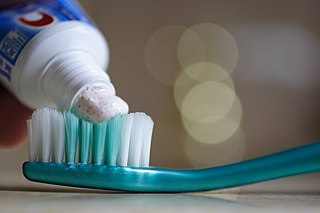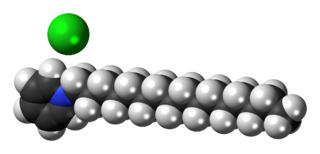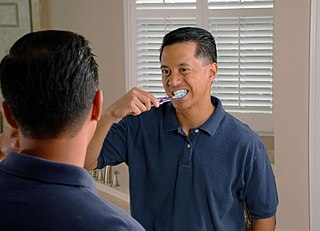
A toothbrush is an oral hygiene tool used to clean the teeth, gums, and tongue. It consists of a head of tightly clustered bristles, atop of which toothpaste can be applied, mounted on a handle which facilitates the cleaning of hard-to-reach areas of the mouth. They should be used in conjunction with something to clean between the teeth where the bristles of the toothbrush cannot reach - for example floss, tape or interdental brushes.

Toothpaste is a paste or gel dentifrice used with a toothbrush to clean and maintain the aesthetics and health of teeth. Toothpaste is used to promote oral hygiene: it is an abrasive that aids in removing dental plaque and food from the teeth, assists in suppressing halitosis, and delivers active ingredients to help prevent tooth decay and gum disease (gingivitis). Owing to differences in composition and fluoride content, not all toothpastes are equally effective in maintaining oral health. The decline of tooth decay during the 20th century has been attributed to the introduction and regular use of fluoride-containing toothpastes worldwide. Large amounts of swallowed toothpaste can be poisonous. Common colors for toothpaste include white and blue.
Teeth cleaning is part of oral hygiene and involves the removal of dental plaque from teeth with the intention of preventing cavities, gingivitis, and periodontal disease. People routinely clean their own teeth by brushing and interdental cleaning, and dental hygienists can remove hardened deposits (tartar) not removed by routine cleaning. Those with dentures and natural teeth may supplement their cleaning with a denture cleaner.

Tooth decay, also known as cavities or caries, is the breakdown of teeth due to acids produced by bacteria. The cavities may be a number of different colors, from yellow to black. Symptoms may include pain and difficulty eating. Complications may include inflammation of the tissue around the tooth, tooth loss and infection or abscess formation. Tooth regeneration is an on-going stem cell based field of study that is trying to reverse the effects of decay, unlike most current methods which only try to make dealing with the effects easier.
Crest is an American brand of toothpaste and other oral hygiene products made by American multinational Procter & Gamble (P&G) and sold worldwide. In many countries in Europe, such as Germany, Bulgaria, Serbia, Ukraine, Belarus, Russia, Poland, Hungary, Latvia, Romania, Estonia and Lithuania, it is sold as Blend-A-Med, the name of an established German toothpaste acquired by P&G in 1987. In France, Spain, Italy, Israel, Sweden, Finland, Argentina, Belgium, the Netherlands, Brazil, the United Kingdom, the Republic of Ireland, Australia, Nigeria, Greece, Uruguay and Colombia, P&G markets similar toothpaste formulations under the Oral-B brand.

Abrasion is the non-carious, mechanical wear of tooth from interaction with objects other than tooth-tooth contact. It most commonly affects the premolars and canines, usually along the cervical margins. Based on clinical surveys, studies have shown that abrasion is the most common but not the sole aetiological factor for development of non-carious cervical lesions (NCCL) and is most frequently caused by incorrect toothbrushing technique.

Acid erosion is a type of tooth wear. It is defined as the irreversible loss of tooth structure due to chemical dissolution by acids not of bacterial origin. Dental erosion is the most common chronic condition of children ages 5–17, although it is only relatively recently that it has been recognised as a dental health problem. There is widespread ignorance of the damaging effects of acid erosion; this is particularly the case with erosion due to consumption of fruit juices because they tend to be seen as healthy. Acid erosion begins initially in the enamel, causing it to become thin, and can progress into dentin, giving the tooth a dull yellow appearance and leading to dentin hypersensitivity.

Plaque Attack is a 1983 video game for the Atari 2600 that was made by Activision. The player must shoot food to protect teeth inside a person's mouth. Steve Cartwright, who designed the game, said that game was meant to help people develop good dental habits.

Fluoride therapy is the use of fluoride for medical purposes. Fluoride supplements are recommended to prevent tooth decay in children older than six months in areas where the drinking water is low in fluoride. It is typically used as a liquid, pill, or paste by mouth. Fluoride has also been used to treat a number of bone diseases.

Dentifrices, including toothpowder and toothpaste, are agents used along with a toothbrush to aid in removal of dental plaque. They are supplied in paste, powder or gel. Many dentifrices have been produced over the years, some focusing on marketing strategies to sell products, such as offering whitening capabilities. The most essential dentifrice recommended by dentists is toothpaste which is used in conjunction with a toothbrush to help remove food debris and dental plaque. Dentifrice is also the French word for toothpaste.

Cetylpyridinium chloride (CPC) is a cationic quaternary ammonium compound used in some types of mouthwashes, toothpastes, lozenges, throat sprays, breath sprays, and nasal sprays. It is an antiseptic that kills bacteria and other microorganisms. It has been shown to be effective in preventing dental plaque and reducing gingivitis. It has also been used as an ingredient in certain pesticides. Though one study seems to indicate cetylpyridinium chloride does not cause brown tooth stains, at least one mouthwash containing CPC as an active ingredient bears the warning label "In some cases, antimicrobial rinses may cause surface staining to teeth," following a failed class-action lawsuit brought by customers whose teeth were stained.
Dentin hypersensitivity is dental pain which is sharp in character and of short duration, arising from exposed dentin surfaces in response to stimuli, typically thermal, evaporative, tactile, osmotic, chemical or electrical; and which cannot be ascribed to any other dental disease.

Tooth brushing is the act of scrubbing teeth with a toothbrush equipped with toothpaste. Interdental cleaning can be useful with tooth brushing, and together these two activities are the primary means of cleaning teeth, one of the main aspects of oral hygiene. The recommended amount of time for tooth brushing is two minutes.

Colgate is an American brand principally used for oral hygiene products such as toothpastes, toothbrushes, mouthwashes and dental floss. Manufactured by Colgate-Palmolive, Colgate's oral hygiene products were first sold by the company in 1873, sixteen years after the death of the founder, William Colgate. The company originally sold soap.

Oral hygiene is the practice of keeping one's oral cavity clean and free of disease and other problems by regular brushing of the teeth and adopting good hygiene habits. It is important that oral hygiene be carried out on a regular basis to enable prevention of dental disease and bad breath. The most common types of dental disease are tooth decay and gum diseases, including gingivitis, and periodontitis.
Dental pertains to the teeth, including dentistry. Topics related to the dentistry, the human mouth and teeth include:

Tooth Protectors is a rare video game for the Atari 2600 video game console. It was released exclusively via mail order in 1983 by American pharmaceutical and consumer goods manufacturer Johnson & Johnson.

Tooth Invaders is a video game released by Commodore International for its VIC-20 home computer in 1981 and later for the Commodore 64 in 1982. It was developed in association with Camelot Marketing Group in order to positively reinforce the pros of brushing, flossing, and healthy dental care. Seen as a fun way to teach children the importance of dental care, players fight as "Plaqueman" to fight plaque using a toothbrush and dental floss. It was also made in association with the American Dental Association, released during National Dental Month, and supported by dentists.
Burst is an American brand of toothpaste and other oral hygiene products made by the e-commerce company Burst Oral Care. It makes electric toothbrushes, dental floss, and tooth whitening strips. The company was co-founded in 2017 by Hamish Khayat and Brittany Stewart in California.













